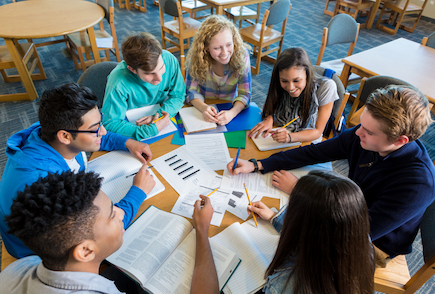Tips from CAPS: How to stay sane during finals
By CAPS Counselor-in-Training Alexandra Maxwell
It’s that time of year, friends. The fall semester is nearing its conclusion and we all know what that brings: All night study sessions, maybe a desperate Google search on a concept that isn’t making sense, or perhaps frantically stuffing every bit of knowledge you can in your tired brain before exam week. Before you form a WhatsApp group with your classmates to share notes, read this, take a deep breath and maybe brave the colder temperatures for walk outside.
Gathered here are some tried and true tips, along with suggestions from the National Institute of Mental Health on how to approach finals week like the calm, collected, self-care hero you really are.
Do NOT sacrifice shut-eye
Easier said than done when your mind won’t stop with the racing thoughts, but sleep is your very best friend when it comes to learning. Our brains use rest to sort and file new information. If you want to remember your organic chemistry, give your brain a chance to integrate the concepts and stick to a sleep schedule. We also know that sleep deprivation can actually worsen symptoms of stress and anxiety, so get a solid 7 to 9 hours of sleep.
Exercise
Don’t skip out on moving your body! Exercise is a big stress reducer, and it doesn’t have to look like a long session at the gym, either. You can go for a quick walk around campus, enlist your study buddies so that you can all take a break together or, if you’re not feeling the group vibe, put on your headphones with your favorite music and dance it out. TLDR: Move your body for at least 20 minutes a day.
Make yourself a study schedule
When all of your deadlines are swirling in your mind, it can be really difficult to figure out what you need to do next. Creating a time management schedule can be a helpful way to clearly define where to focus your energy. Break down your assignments into smaller action items and evenly distribute those items throughout your week. If you’re into lists, you can put these smaller action items on a daily to-do list and it will feel like a solid win every time you get to cross off an item.
Eat real meals
OK, I know this one seems like a big ol’ DUH but hear me out: Your brain needs fuel. It needs carbohydrates to do all the rad things your brain can do. Your body needs nourishment when you are under stress. Do not skip out on eating healthy, well-rounded meals. Convenience can be a factor here — sometimes you need to grab a quick bite between classes — but make good choices for your body and your brain. Fruits, veggies, whole grains and lots of protein! Try to stay clear of convenient foods loaded up with sugars, as these will have you crashing in no time. Your body and mind are working hard this semester; show yourself some kindness and fuel up with foods your body can really use.
Don’t skip out on rest, relaxation and hobbies
This tip to some may sound like an indulgence. So let me counter your doubts with a question: You’re more than just a studying machine, right? You’re a complex person with interests and needs. So what brings you joy? What are your hobbies? What feels playful and creative? What leaves you with a sense of peace? Don’t drop your hobbies and your interests when the going gets tough, friends. Make room for what matters in your streamlined schedule. Give yourself some time away from the pressure of studying to let your brain and body recall what it means to tap into creativity, expression and feelings of peace.
Laughter & friends
In the lingo of the mental health world, we call friendships protective factors, because that’s exactly what they are. Trusted friends who listen when you need to vent or are quick to relate to your struggles or share a joke are crucial to our well-being. Make time during finals week to catch up with your friends. If they are at a distance, set up a call; if they’re close by, see if they want to join you on a walk around campus or study with you at the library. Chances are, they’re feeling some of the same stress and worries you are and also could use a friendly face or a listening ear as the semester ends.
Above all, I urge you all to remember this: You are a whole human being. You need sleep, nutritious meals, exercise, play and connection. Don’t deny your needs when the stressors add up. Find small, easy ways to integrate them into your days. And if you make some mistakes on an exam or a final paper, remember this: Mistakes are not a final sentence on your character or your abilities. They are, however, good information about what you might need to focus on more in the future.
Don’t forget the resources available to you here on campus:
Academic Success Center: success.wayne.edu
Student Disability Services: studentdisability.wayne.edu
CAPS: WSU Applebaum offers dedicated Counseling and Psychological Services support to students on a group or individual basis. If you are interested in participating in CAPS services that can help, call 313-577-3243 or send an email. If you are struggling after 5 p.m. or during a weekend, holiday or university closure, call the CAPS Afterhours Program at 313-577-CAPS.
Works cited: Prince-Stehley, Kayla. (2015, December 8). 7 Tips for Coping with the Stress of Finals. National Institute of Mental Health. Nami.org.
An anchor in urban health care
The Eugene Applebaum College of Pharmacy and Health Sciences is built on more than 100 years of tradition and innovation in the heart of Detroit. We have grown deep roots in our city, harnessing its powerhouse hospital systems and community service organizations as vibrant, real-world training grounds for students, with an ongoing focus on social justice in health care. And our research at all levels — from undergraduates to veteran faculty members — translates into creative solutions for healthier communities.
Wayne State University is a premier urban research institution offering approximately 350 academic programs through 13 schools and colleges to nearly 24,000 students.